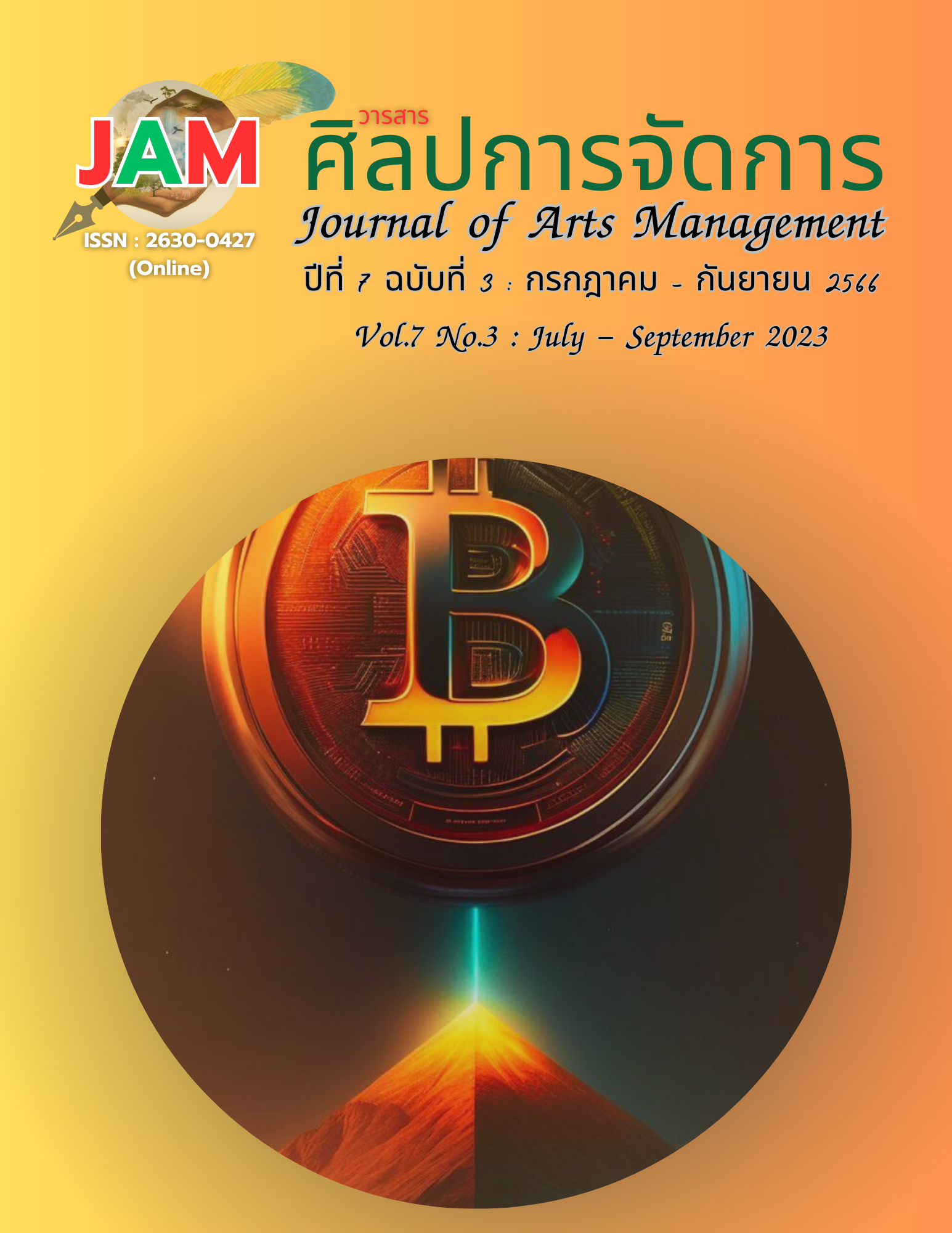การพัฒนารูปแบบการโค้ชชิ่งแบบอิเล็กทรอนิกส์ตามแนวคิดโกรว์ เพื่อส่งเสริมสมรรถนะการจัดการเรียนรู้ของนักศึกษาวิชาชีพครู
Main Article Content
บทคัดย่อ
บทความนี้มีวัตถุประสงค์เพื่อ 1) ศึกษาสภาพปัจจุบัน สภาพปัญหา และแนวทางในการพัฒนาสมรรถนะการจัดการเรียนรู้ของนักศึกษาวิชาชีพครู 2) พัฒนารูปแบบการโค้ชชิ่งแบบอิเล็กทรอนิกส์ตามแนวคิดโกรว์ เพื่อส่งเสริมสมรรถนะการจัดการเรียนรู้ของนักศึกษาวิชาชีพครู และ 3) ศึกษาผลการใช้รูปแบบการโค้ชชิ่งแบบอิเล็กทรอนิกส์ตามแนวคิดโกรว์ เพื่อส่งเสริมสมรรถนะการจัดการเรียนรู้ของนักศึกษาวิชาชีพครู เครื่องมือที่ใช้เก็บรวบรวมข้อมูล ได้แก่ แบบสัมภาษณ์เชิงลึก แบบประเมินคุณภาพรูปแบบ และแบบประเมินสมรรถนะการจัดการเรียนรู้ สถิติที่ใช้ในการวิเคราะห์ข้อมูล ได้แก่ , SD., T-test Dependent
ผลการวิจัยพบว่า 1) สภาพปัจจุบัน สภาพปัญหา และแนวทางในการพัฒนาสมรรถนะการจัดการเรียนรู้ คือ 1.1 สภาพปัจจุบัน ได้แก่ การเตรียมความพร้อม การนิเทศ และการวัดประเมินผล 1.2 สภาพปัญหา ได้แก่ ปัญหาของนักคึกษาวิชาชีพครูและอาจารย์นิเทศก์ 1.3 แนวทางการพัฒนา ได้แก่ เป้าหมาย บทบาทของผู้โค้ช บทบาทของนักศึกษา คู่มือ และเครื่องมือ 2) รูปแบบการโค้ชชิ่งแบบอิเล็กทรอนิกส์ตามแนวคิดโกรว์เพื่อส่งเสริมสมรรถนะการจัดการเรียนรู้ ประกอบไปด้วย หลักการ วัตถุประสงค์ องค์ประกอบเชิงกระบวนการ แนวปฏิบัติการโค้ชชิ่ง และ เงื่อนไขการนำไปใช้ แบ่งการดำเนินการเป็น 3 ระยะ คือ การเตรียมความพร้อม การดำเนินการโค้ช และการประเมินผลการพัฒนาสมรรถนะ ผลการประเมินความเหมาะสมของรูปแบบ อยู่ในระดับมาก ( = 4.49, SD. = 0.55) และ 3) ผลการประเมินสมรรถนะการจัดการเรียนรู้ พบว่า สมรรถนะการจัดการเรียนรู้ของนักศึกษาวิชาชีพครู หลังการทดลองสูงขึ้นอย่างมีนัยสำคัญทางสถิติที่ระดับ .05
Article Details

อนุญาตภายใต้เงื่อนไข Creative Commons Attribution-NonCommercial-NoDerivatives 4.0 International License.
ทัศนะและความคิดเห็นที่ปรากฏในบทความในวารสารศิลปการจัดการ ถือเป็นความรับผิดชอบของผู้เขียนบทความนั้น และไม่ถือเป็นทัศนะและความรับผิดชอบของกองบรรณาธิการ ยินยอมว่าบทความเป็นลิขสิทธิ์ของวารสารศิลปการจัดการ
เอกสารอ้างอิง
Chaikhwun, S. (2020). The Effects of Supervision Through CLEAR Coaching Model of First–Line Nurse Managers. Journal of Education Rajabhat Maha Sarakham University, 17(2), 160–169.
Donna, M. P., Marcia, L. R. (2014). eCoaching: The Effects on Co-Teachers’ Planning and Instruction. Teacher Education and Special Education, 37(3), 191–215.
Kanjanawasee, S. (2013). Classical Test Theory (7th ed.). Chulalongkorn University.
Meesomsarn, K. (2017). Guidelines for learning management competency development of early childhood education teachers in the 21st century. Journal of Valaya Alongkorn Review (Humanities and Social Science), 7(2), 45-56.
Ladyshewsky, R., & Ronald, G. P. (2020 May 31). Exploring Adult Learners' Usage of Information Communication Technology during a Virtual Peer Coaching Experience. https://olj.onlinelearningconsortium.org/index.php/olj/article/view/520.
Manee-on, S. (2017). Using Professional Learning Community Strategies in Schools. Journal of Education, Silpakorn University, 15(1), 28-39.
Ministry of Education. (2002). National Education ACT, B.E. 2542 (2nd ed.). The Express Transportation Organization of Thailand Printing House.
Phramaha, N. K. (2021). The Development of Multiple Methods Coaching Model for Developing Learning Management Based on Four Noble Truths of Moral Teaching Monks to Enhance Reasoning Thinking in Buddhist for Students in Fundamental Education[Doctoral Dissertation, Silpakorn University].
Phuangphae, P. (2014). The Development of an Instructional Model to Enhance Social Studies Learning Activities Design Competency for Pre-Service Teachers, Doctor of Philosophy Program in Curriculum and Instruction[Doctoral Dissertation, Silpakorn University].
Ribbers, A., & Waringa, A. (2022 March 1). E-Coaching: Theory and practice for a new online approach to coaching. https://books.google.co.th/books?id=3AqUBwAAQBAJ&printsec=frontcover&hl=th& source=gbs_ge_summary_r&cad=0#v=onepage&q&f=false.
Samal, W. (2018) Synthesis of Web Based Teacher’s Training Model with the Support of Knowledge Management and Coaching System, Journal of The Eastern University of Management and Technology, 15(2), 299.
Sriakaralarp, W. (2016). Model Development for Reinforcing Creative Thinking via Cognitive Coaching in Management and Service for Public Sector[Doctoral Dissertation, Silpakorn University].
Sripairote, T. (2018). Influence of Project-based Learning Coaching Program on Teacher Competency for Students’ Learning and Innovative Skills[Doctoral Dissertation, Srinakharinwirot University].
Sukwan, O. (2018). The Development of a Coaching Model for Industrial Students Under the Dual Vocational Training System for Entrepreneur Trainers: Concentration in Industrial Education[Doctoral Dissertation, Srinakharinwirot University].
Warinin, N. (2014) The Model of Teachers’ Competency Development in Learning Management for Primary Schools in Kamphaeng Phet Primary Educational Service Area Office 2. Veridian E-Journal, Silpakorn University (Humanities, Social Sciences and Arts), 7(2), 1-13.
Whitmore, J. (2018). Coaching for performance (5th ed.). London: Nicholas Brealey.


